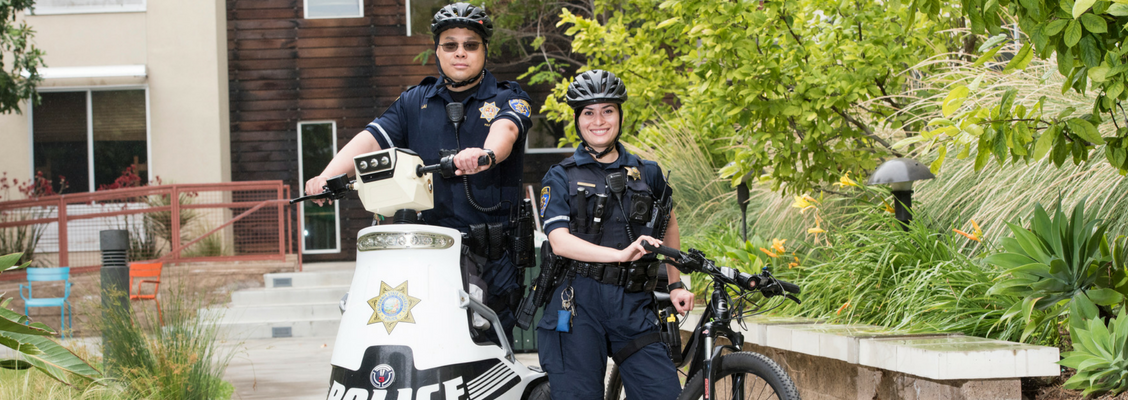Living on campus is a great element of the college experience. However, being on your own and away from home comes with added responsibilities. The information contained here is provided to share with you what you can do to actively take part in your personal safety. We hope you will follow the crime prevention advice and suggestions and do your part to deter crime and decrease your chances of becoming a victim.
Resources for Housing Residents & RA’s
A Letter to New Residents
Acquaintance Rape-The “Silent Epidemic”
Alcohol Awareness
Alcohol Awareness (printer-friendly brochure)
Bicycle Safety & Security
Community Policing Team Bio’s
Crime Prevention Strategies for Residential Burglaries
Dorm Safety & Security Measures (printer-friendly brochure)
Drug Awareness
Matador Patrol, Personal Safety Escorts
Rape & Sexual Assault Awareness
Safety Workshops
Safety Apps
What RA's Need to Know About Alcohol
More Publications & Resources
University Police Community Policing Team
The Community Policing Team comprises two police officers dedicated to the housing community. The Community Policing Team (CPT) operates out of the police substation, south of UPA 14. The substation serves as the base of operations for the community policing team and enables housing residents to take care of basic police services, like filing a police report or obtaining crime prevention information, in lieu of visiting our primary Police Services facility at the corner of Darby and Prairie streets. The team is on duty Wednesday-Saturday evenings, 4pm - 2am. Call (818) 677-2107 or stop by the substation and visit the Community Cops!
Resident Advisors!
Request that your Community Policing Team conduct presentations on alcohol and drug awareness, sexual assault prevention, personal safety, bicycle safety and many other topics to get your residents involved!
Call (818) 677-2107 or email: communitycops@csun.edu
Recommended "DOs" and "DON'Ts" for Housing Residents
DO:
- Keep your door, balcony and bedroom windows locked, even when you are at home. It's easy for others to enter your apartment without you knowing, particularly if you are in a back room, or your stereo or television is on.
- Keep your balcony doors, including the upper floors, locked. A screen door is NOT a security device. It is not uncommon for persons to climb to upper-floor balconies and enter illegally.
- Report crimes or suspicious persons/activities to the University Police Department as soon as possible. Dial 9-1-1 in the event of an emergency or (818) 677-2111 for non-emergencies.
- Take advantage of the Matador Patrol Safety Escort Service. Don't walk alone on campus. Call the "Matador Patrol" at (818) 677-2111 and they will safely escort you to your car, dorm or classroom on campus. This service is offered Monday through Thursday from dusk to 11:30pm.
- Register valuable property with the S.T.O.P. Program. Security Tracking of Office Property (S.T.O.P.) is a deterrent and recovery program for valuable property, most commonly laptop computers. Offered in collaboration between the Department of Police Services and Information Technology Resources, the program incorporates a security plate and warning label which are applied to the property being protected. Your identifying information is entered into a national database, which increases the chances of your property being returned to you if lost or stolen and recovered. The highly visible warning label warns would-be thieves by clearly marking the property and making it hard to resell. Contact the Police Services Reception desk at (818) 677-2266 for more information or visit our Computer Security & STOP web page.
- Record the make, model, and serial number of valuables and keep the records in a safe place. Contact the Police Services Reception desk at (818) 677-2266 for a valuable Property Record Log for your use.
- Engrave your property with your driver’s license number. Borrow an engraver for free from the University Police by calling the Police Services Reception desk at (818) 677-2266.
- Take extra security precautions with your bicycle and purchase a "U" bolt type lock. Because it's left locked to a bicycle rack for an extended period of time it's more vulnerable to theft.
- Leave valuables, particularly jewelry, at home if it is not necessary to have them at your campus residence.
- Check the area for suspicious persons before walking to or exiting from your vehicle.
- Discuss these crime prevention tips with your roommates.
DON'T:
- DO NOT allow strangers, or hold large gatherings, in your residence. It is easy for someone to steal small items without being noticed.
- DO NOT prop open the exterior building doors. You are jeopardizing other people's safety as well as your own.
- DO NOT leave messages on your door announcing who lives in the room or your departing or returning times. This can alert potential thieves.
- DO NOT leave items like backpacks, laptops, cell phones or text books unattended in communal areas, even if it's "just for a minute," that's all the time a thief needs to take your belongings.
- DO NOT leave large sums of money, jewelry or valuable items in your room. Try to keep them locked up or out of sight.
- DO NOT loan your room key to someone, even a friend, it is a violation of housing policy and misuse of a state key.
- DO NOT hesitate to contact police if you are a victim of a crime or have witnessed a crime in progress. This includes reporting door to door solicitors.
The Facts About Sexual Assault On Campus
- Nearly all sexual assaults that are reported to university police occur in the on campus residence halls, University Park Apartments (UPA's).
- Of those reported to University police, nearly all sexual assault victims know their assailant. They were either a friend, ex-boyfriend, current boyfriend, classmate or acquaintance of the victim.
- Nation wide fact: 95% of all rapes occur where the rapist, victim or both were under the influence of alcohol.
- Nation wide fact: Rape/sexual assault is the most under reported crime on college campuses.





